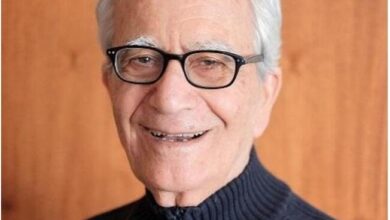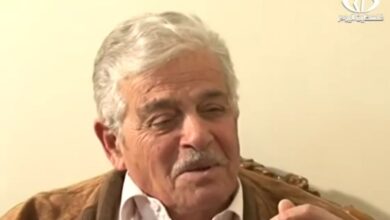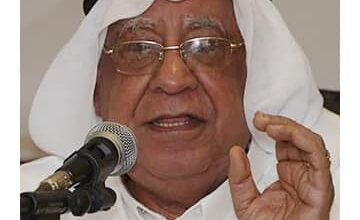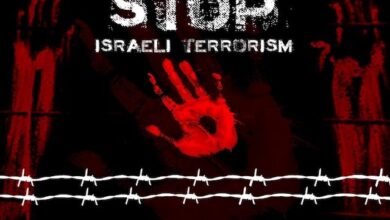How did Palestine win the battle for American universities? By Ahmed Nathif
By Ahmed Nathif

How did Palestine win the battle for American universities?
By Ahmed Nathif
Friday 26 April 2024
Palestine is being blown, but it still leaves no stone in stone. The impact of Palestine on the world today is not just a “butterfly trace” but the impact of an earthquake, whose extent we do not know where it will end. While the Biden administration has just voted in favor of new financial aid to Israel, anger is spreading on U.S. college campuses. After the arrest of a hundred Columbia University students for their support for Palestine, discontent spread like fire at Yale, MIT, the University of North Carolina, Emerson, Harvard University, the University of North Carolina Chapel Hill, Vanderbilt, and Berkeley, the U.S. government met with further repression. Still, it became a model spreading in other countries, including the United Kingdom, France, and Australia. As happened at Columbia University, the demand of students at all these universities is “to end the agreements between their universities, Israeli arms manufacturers and companies involved in occupation and genocide.”
This student radicalism, the likes of which we have not seen in decades, especially in elite universities where most of the students come from the upper classes, encouraged other sectors of the academic community to join the Palestine solidarity camp and condemn the Zionist occupation, namely the sector of teachers and university employees. The crackdown by administrative and security authorities has prompted hundreds of faculty and staff to sign calls for an academic boycott, most notably the Columbia College and Barnard College regulations, signed by more than 1,400 academics until the sanctions on students are lifted. This would frighten the authority, which wants to avoid rapprochement between the student union and the teachers-staff union because it implies control of universities.
This American university awakening against imperialism and colonialism is not unprecedented in the American University’s history, as the academic community’s role – students and teachers – during the Vietnam War was instrumental in convincing domestic public opinion of the enormity of the American colonial war. But it seems unprecedented in being hostile to Zionism and anti-Zionist policies of the United States. Therefore, it is a manifestation of the success of a Palestinian Arab voice that has been working for years, under political and security pressure and with weak capabilities, to publicize the Palestinian cause in the university community. It is also one of the indirect gains of the Al-Aqsa flood and the subsequent steadfastness of the armed resistance and its people in Gaza.
Vietnam and the deepening of internal contradictions
In early 1968, the combined forces of the National Liberation Front of Vietnam launched a strategic “Tet Offensive” against the U.S. occupation forces. The attack undermined the prestige of American deterrence, although it did not bring the final victory of the Vietnamese national movement. Tate was a turning point, not only militarily in the conflict but also opened the world’s eyes to the horrors of occupation. In the United States, the attack prompted the development of the anti-war movement, which became more solid after the student movement joined it. To continue the war, the Lendon Johnson (Democratic) government continued to call on young people to the front despite a growing wave of protest. After a series of crises and weak opinion polls, he withdrew from the presidential campaign for re-election on March 31 that year. At Columbia University, it was these political contexts, along with mobilization against the university’s racist policies, that drove a thousand students to occupy five university buildings. The occupation of Colombia marked the beginning of the student uprising against the war in Vietnam, which culminated in a student strike at 900 campuses and high schools in 1970. U.S. authorities countered the Columbia University uprising with further repression as a thousand police officers occupied the campus and arrested 700 students. This resulted in the campus being closed for the rest of the semester.
All the global momentum that continues to grow around the question of Palestine, despite the high price, is thanks to the legendary steadfastness of the resistance.
In the aftermath of the “Tate Offensive,” the anti-war movement celebrated Johnson’s withdrawal as a victory. This movement flourished in 1968 after the Washington demonstration of October 21, 1967, in which 100,000 people participated. The massacre of the Vietnamese village of Mae Lai, on the orders of Lieutenant William Calle, in March 1968 took root in public rejection of the war. This was reinforced by a national university and high school student strike that rallied about a million people on April 26, 1968. The anti-war movement experienced more aggressive and impressive movements in 1969 and 1970 when Richard Nixon and Henry Kissinger intensified the bombing and expanded it to Laos.
However, the peak of American student disobedience in the face of the war began in April 1970, when President Nixon announced that he had ordered the invasion of Cambodia. The eastern part of Cambodia was filled with troops from the Vietnamese People’s Army and their allies from the National Liberation Movement, who used the area to launch attacks on South Vietnam. At the time, most Americans believed that the Vietnam War was coming to an end thanks to a policy of “Vietnamization” aimed at replacing U.S. combat forces with better-trained South Vietnamese forces. Cambodia was neutral, and its civil war raged. The next day, Labor Day, American universities caught outrage. Kent State University has seen daily demonstrations under the slogan “Why the Reserve Officer Training Building Still Stands,” referencing an on-campus barracks for U.S. troops where some officers are trained. But the May Fourth demonstration was bloody when National Guard forces advanced towards the knoll where protesters were gathering and fired into the crowd, killing four and wounding nine university students. U.S. forces did the same at Jackson State College in Mississippi, a majority black state, when they opened fire, killing two students and wounding 12 others who were demonstrating against the war. Before that, an even more cruel massacre occurred on the campus of the University of South Carolina, Orangeburg, when U.S. Army armored vehicles and more than 100 heavily armed officers cordoned off the campus, and another 450 were stationed in the city center. About 200 students were gathering around a burning fire on campus after completing an anti-war protest rally. Without warning, the crackle of gunfire shattered the stillness of the night. It lasted less than ten seconds, leaving twenty-eight injured and three dead, and was documented by Jodie Richardson and Pastor Cram in Distorted Justice: The Massacre of Orangeburg (2009).
The steadfastness of the Vietnamese resistance and its people was the primary determinant of the course of the war and later the first impetus for the American withdrawal from Vietnam beginning in 1973. However, the rise of American universities against their country’s colonial policies, which opened the door wide for other categories of intellectuals and activists to engage in anti-war, formed the basis of American internal contradictions, which was one of the reasons for the failure of the American effort in Vietnam. These secondary internal contradictions in the enemy’s camp are fundamental in deepening its wounds, disrupting its central endeavor to continue the occupation, and thus deepening its principal contradiction. This is evidenced by the slogan of the black anti-war movement, the most radical faction: “Bring the war home!” – turning the secondary contradiction into a major one.
How did the Palestinian voice succeed, and why is this gain significant?
The first reason Palestine has succeeded in winning unprecedented mobilization in American universities is due to the justice of its cause. The magnitude of the human tragedy and the clarity of the image of the half-year-old genocide, broadcast live in the media and social media, are powerful on their own, without arguments or propaganda, to impose themselves before the world. Second, the flood of Al-Aqsa and its radical transformation in the world breathed life into the Palestinian cause, which, until last September, the Western-Arab-Israeli alliance was finalizing the decision to liquidate once and for all. Third, the steadfastness of the Palestinian resistance, popular and armed. If the resistance had been defeated in the first days, everything would have ended, and perhaps today, we will be witnessing the sessions of the victors – Israel and its Western and Arab allies – dividing Gaza’s legacy and determining its fate. All the global momentum that continues to grow around the question of Palestine, despite the high price, is thanks to the legendary steadfastness of the resistance. Fourth, the fragility of Zionist arguments has been exposed, and the loss of the privilege of “victim-power” that has dominated Western mentality for decades. Fifth, the long, arduous, and costly work done by successive generations of the Arab student movement in the United States over the years, despite pressure in the face of Zionism to publicize the Palestinian cause.
But the question is, what is the importance of this gain? First, any voice we gain on the side of our cause will be important in this world, as well as a voice within elite training centers in the United States, the country sponsoring the Gaza genocide with weapons and political support. Second, in addition to deepening internal contradictions in American society, this pro-Palestine and anti-Zionist student outpouring will deepen President Biden’s electoral and popular wounds, and this should be one of the goals of the Palestine Solidarity Movement in the United States to punish all those involved in the genocide. The mobilization underway today in Colombia is highly symbolic because of its status as an elite university and one of eight schools in the Ivy League. These private universities—with high budgets, exorbitant fees, and often meager acceptance rates—train the country’s elite, but they are also essential and well-funded research centers. The work there usually serves the interests of the military-industrial academic complex. Therefore, it receives massive funding from major corporations, digital and military, as well as funding from Israel itself, with about 100 American universities receiving donations or contracts from Israel totaling $375 million over the past two decades.
The Israeli prime minister described the uprising of American universities as shocking and must stop: “A mob of anti-Semitists has taken over leading universities. They are calling for the destruction of the State of Israel. (…) Fortunately, local and federal officials have acted differently, but more must be done.”
Despite its global decline, the United States still leads the Western camp and the world politically, militarily, and culturally. Therefore, this American university donation could be the starting point for a global university intifada with the main title of Palestine. Or it will motivate many international universities to take proactive measures to stop dealing with Israel and avoid the expected problems. Since the beginning of the war, at least eight universities in Canada, Brazil, Italy, Belgium, and Norway have passed measures to stop cooperation with Israeli universities due to student protests and the teaching framework, and the protests have led to partial boycotts at other universities. Undoubtedly, a large-scale academic boycott would seriously damage Israeli academia and indirectly also advance technology and the medical and science sectors that specialists are aware cannot develop without external scientific partnerships. Therefore, the academic boycott movement in applied science rights would be more egregious for the enemy than any other boycott movement in any field because it directly strikes at the foundation of any research work with applied goals needed by the war government and its military institutions.
Translated from Arabic by Ibrahim Ebeid.





